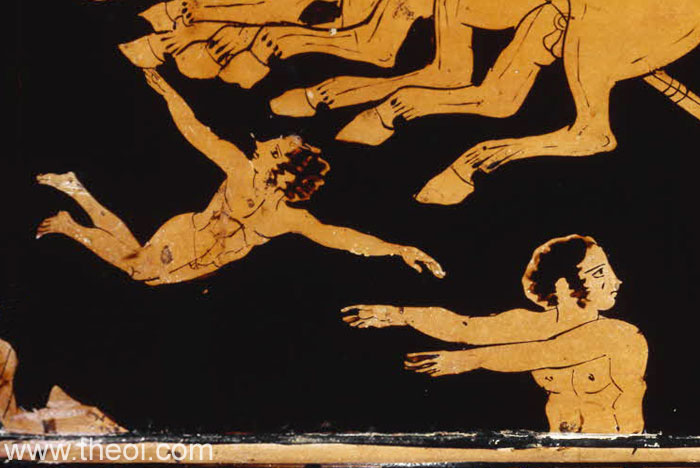PYROEIS
Greek Name
Πυροεις
Transliteration
Pyroeis
Latin Spelling
Pyroeis
Translation
Fiery (pyroeis, pyra)

PYROEIS was the god of the wandering star (aster planetos) Areios, the planet Mars. His name was derived from the Greek word pyra "fire", so-named because of his reddish tinge. He was also named Mesonyx the Midnight Star. Unlike his brother Eosphoros (the star ), Pyroeis was rarely personified. The star belonged to Ares, god of war, or else Herakles.
FAMILY OF PYROEIS
PARENTS
ASTRAIOS & EOS (parents of the Astra, presumably Pyroeis) (Hesiod Theogony 378, Apollodorus 1.8)
ALTERNATE NAMES
Greek Name
Μεσονυξ
Αστηρ Αρειος
Transliteration
Mesonyx
Astêr Areios
Latin Spelling
Mesonyx
Aster Areius
Translation
Midnight (mesos, nyx)
Star of Ares (Mars)
CLASSICAL LITERATURE QUOTES
Hesiod, Theogony 378 ff (trans. Evelyn-White) (Greek epic C8th or C7th B.C.) :
"And Eos (Dawn) bare to Astraios (Astraeus, Starry) the strong-hearted Anemoi (Winds) . . . a goddess mating in love with a god. And after these Erigenia [Eos] bare the star Eosphorus (Dawn-bringer), and the gleaming Astra (Stars) with which heaven is crowned."
Homeric Hymn 8 to Ares 6 (trans. Evelyn-White) (Greek epic C7th - 4th B.C.) :
"[Ares] who whirl your fiery sphere among the planets in their sevenfold courses through the ether (aitheros) wherein your blazing steeds ever bear you above the third firmament of heaven." [N.B. Ares is here the star Mars.]
Greek Lyric III Stesichorus Frag 259 (from Choroeboscus and Herodian) (trans. Campbell, Vol. Greek Lyric III) (C6th to 7th B.C.) :
"Mesonukhos (Midnight-star) the Pythagorean name for one of the seven Planetoi (Planets) [i.e. Mars or less probably Jupiter or Saturn]. Stesichorus mentions it."
Pseudo-Apollodorus, Bibliotheca 1. 8 - 9 (trans. Aldrich) (Greek mythographer C2nd A.D.) :
"The Titanes (Titans) had children . . . Eos (Dawn) and Astraios (Astraeus, Starry) were parents of Anemoi (Winds) and Astra (Stars)."
Apollonius Rhodius, Argonautica 1. 774 ff (trans. Rieu) (Greek epic C3rd B.C.) :
"Like that bright Aster (Star) whose beautiful red beams, piercing the darkness as he rises over the roof-tops."
Pseudo-Hyginus, Astronomica 2. 42 (trans. Grant) (Roman mythographer C2nd A.D.) :
"Planets. It remains for us to speak of the five stars which many have called wandering, and which the Greeks call Planeta . . .
The third star is that of Mars [Ares], though others say it belongs to Hercules . . . Since she [Aphrodite] inflamed him violently with love, she called the star Pyroeis, indicating this fact."
Cicero, De Natura Deorum 2. 15 (trans. Rackham) (Roman rhetorician C1st B.C.) :
"The orbit next below [the star Jupiter] is that of Pyroeis (the Fiery), which is called the Star (Stella) of Mars, and this covers the same orbit as the two planets above it in twenty-four months all but (I think) six days."
Cicero, De Natura Deorum 2. 20 :
"Most marvellous [of all the stars of heaven] are the motions of the five Stars (Stellae), falsely called Planets (Planeta) or Wandering Stars (Stellae Errantes) . . .
Below this [the planet Saturn] and nearer to the earth moves the Star (Stella) of Jupiter, called Phaethon (the Blazing), which completes the same circuit of the twelve signs of the zodiac in twelve years, and makes the same variations during its course as the star of Saturnus (Saturn) . . .
This regularity therefore in the Stars (Stellae), this exact punctuality throughout all eternity notwithstanding the great variety of their courses, is to me incomprehensible without rational intelligence and purpose. And if we observe these attributes in the Stars (Stellae), we cannot fail to enrol even them among the number of the gods."
Nonnus, Dionysiaca 5. 67 ff (trans. Rouse) (Greek epic C5th A.D.) :
"He [Kadmos (Cadmus) founder of Thebes] dedicated the seven gates [of the new-founded city] to the seven planets . . . The fifth he gave to Ares [i.e. the star of Mars]."
SOURCES
GREEK
- Hesiod, Theogony - Greek Epic C8th - 7th B.C.
- The Homeric Hymns - Greek Epic C8th - 4th B.C.
- Greek Lyric III Stesichorus, Fragments - Greek Lyric C7th - 6th B.C.
- Apollodorus, The Library - Greek Mythography C2nd A.D.
- Apollonius Rhodius, The Argonautica - Greek Epic C3rd B.C.
- Nonnus, Dionysiaca - Greek Epic C5th A.D.
ROMAN
- Hyginus, Astronomica - Latin Mythography C2nd A.D.
- Cicero, De Natura Deorum - Latin Rhetoric C1st B.C.
BIBLIOGRAPHY
A complete bibliography of the translations quoted on this page.